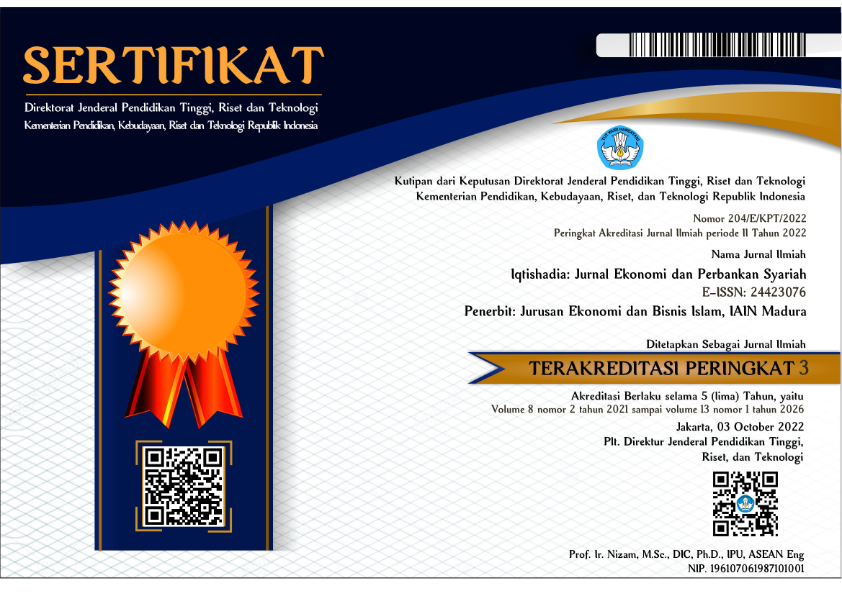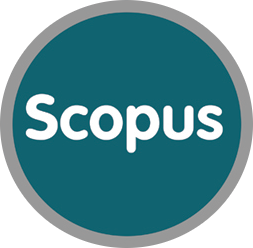Investigating the Effect of Halal Awareness on Purchase Decision for Halal Products in Indonesia: A Metadata Analysis
 Abstract views: 442
,
Abstract views: 442
,
 pdf downloads: 343
pdf downloads: 343
Abstract
The purpose of this study was to examine the development of research on the influence of halal awareness on purchasing decisions for halal products in Indonesia. The method used is meta-analysis by reviewing 9 studies published in 2018-2023 with the help of the OpenMEE application. The results of this study indicate that there is a positive influence from halal awareness on purchase decisions with a p-value obtained of 0.002 and an estimated value of 0.404, which indicates that the strength of the relationship is in the weak category. It was also found that the most significant average effect size was in the halal cosmetics subgroups with a fairly high estimated value so that it was concluded that halal consumer awareness was more visible in the halal cosmetic industry type.
Downloads
References
Ambali, A.R., and A.N. Bakar. “People’s Awareness on Halal Foods and Products: Potential Issues for Policy-Makers.” Procedia-Social and Behavioral Sciences 121 (2014): 3–25.
Anggraini, Inar, and Diah Setyawati Dewanti. “The Effect of Halal Foods Awareness on Purchase Decision with Religiosity as a Moderating Variable.” Journal of Economics Research and Social Sciences 4, no. 1 (2020). doi:10.18196/jerss.040116.
Assidiqi, Sadewa, and Lia Siti Julaeha. “Effect of Price, Sales Promotion and Halal Awareness of Skin Care Product Purchase Decisions (Case Study on Shopee App Users in Jakarta).” IJIET: International Journal of Education, Information Technology and Others 4, no. 4 (2021): 794–810. doi:10.5281/zenodo.5851660.
Bashir, Abdalla Mohamed. “Effect of Halal Awareness, Halal Logo and Attitude on Foreign Consumers’ Purchase Intention.” British Food Journal 121, no. 9 (2019): 1998–2015. doi:10.1108/BFJ-01-2019-0011.
Bhutto, M Y, M Ertz, Y A Soomro, M A A Khan, and W Ali. “Adoption of Halal Cosmetics: Extending the Theory of Planned Behavior with Moderating Role of Halal Literacy (Evidence from Pakistan).” Journal of Islamic Marketing, 2022. doi:10.1108/JIMA-09-2021-0295.
Budiarti, Lita. “Pengaruh Label Halal, Exposure, Dan Health Terhadap Halal Awareness Dan Keputusan Pembelian (Studi Kasus KFC Cabang Kawi).” Universitas Brawijaya, 2018.
Cheung, Christy M.K., and Dimple R. Thadani. “The Impact of Electronic Word-of-Mouth Communication: A Literature Analysis and Integrative Model.” Decision Support Systems 54, no. 1 (2012): 461–70.
Cohen, Jacob. Statistical Power Analysis for the Behavioral Sciences. 2nd ed. United States: Lawrence Erlbaum Associates, 1988.
Davis, Jacqueline, Kerrie Mengersen, Sarah Bennett, and Lorraine Mazerolle. “Viewing Systematic Reviews and Meta-Analysis in Social Research through Different Lenses.” SpringerPlus 3, no. 1 (2014): 1–9. doi:10.1186/2193-1801-3-511.
Dinar Standard. “State of the Global Islamic Economy Report 2022.” DinarStandard & Dubai Economy and Tourism. Dubai, 2022. https://haladinar.io/hdn/doc/report2018.pdf.
Fachrurrozie, Muhsin, Ahmad Nurkhin, Hasan Mukhibad, and Norzaidi Mohd Daud. “Determinants of Halal Food Purchase Decisions for Go Food and Shopee Food Users.” Innovative Marketing 19, no. 1 (2023): 113–25. doi:10.21511/im.19(1).2023.10.
Fauziah, Silvia, and Nur Hidayah Al Amin. “The Influence of Product Knowledge, Religiusity, Halal Awareness of Purchasing Decisions on Halal Products With Attitude As a Mediation Variable.” JMIF: Journal of Management and Islamic Finance 1, no. 2 (2021): 249–66. https://doi.org/10.22515/jmif.v1i2.4690.
Field, Andy P., and Raphael Gillett. “How to Do a Meta-Analysis.” British Journal of Mathematical and Statistical Psychology 63, no. 3 (2010): 665–94. doi:10.1348/000711010X502733.
Hendriana, T., P. Yuliana, M. Kurniawati, N. Ariana, R. Aisyah, M.G. Ayu Aryani, and K. Wandira. “A Qualitative Investigation into Consumption of Halal Cosmetic Products: The Evidance from India.” Journal of Islamic Marketing2 12, no. 7 (2020): 1295–1315.
Huang, Zhao, and Morad Benyoucef. “The Effects of Social Commerce Design on Consumer Purchase Decision-Making: An Empirical Study.” Electronic Commerce Research and Applications2 25 (2017): 40–58.
Juniwati, and Rizqi Maghribi. “The Effect of Halal Awareness and Perceived Quality on the Decision To Purchase Snacks With Brand Image As a Mediation Variable.” Jurnal Ekonomi Bisnis Dan Kewirausahaan (JEBIK) 11, no. 1 (2022): 116–30. http://dx.doi.org/10.26418/jebik.v11i1.51179.
Karimi, S., K.N. Papamichail, and C.P Holland. “The Effect of Prior Knowledge and Decision-Making Style on the Online Purchase Decision-Making Process: A Typology of Consumer Shopping Behaviour.” Decision Support Systems 77 (2015): 137–47.
Lee, T.R., Y.S. Lin, E.S. Kassim, and S. Sebastian. “Consumer Decisions toward Halal Purchase before and during COVID-19 Pandemic: A Grey Relational Analysis Approach.” British Food Journal 125, no. 9 (2023): 3351–67.
Macdonald, E.K., and B.M. Sharp. “Brand Awareness Effect on Consumer Decision Making for a Common, Repeat Purchase Product: A Replication.” Journal of Business Research 48, no. 1 (2000): 5–15.
Muslichah, M., Rose Abdullah, and Lutfi Abdul Razak. “The Effect of Halal Foods Awareness on Purchase Decision with Religiosity as a Moderating Variable: A Study among University Students in Brunei Darussalam.” Journal of Islamic Marketing 11, no. 5 (2020): 1091–1104. doi:10.1108/JIMA-09-2017-0102.
Nakagawa, Shinichi, Malgorzata Lagisz, Michael D. Jennions, Julia Koricheva, Daniel W.A. Noble, Timothy H. Parker, Alfredo Sánchez-Tójar, Yefeng Yang, and Rose E. O’Dea. “Methods for Testing Publication Bias in Ecological and Evolutionary Meta-Analyses.” Methods in Ecology and Evolution 13, no. 1 (2022): 4–21. doi:10.1111/2041-210X.13724.
Omar, E.N., A.A. Ramli, H. Jaafar, L. Abu Hassan, A.K. Othman, and H. Ali. “Factors That Contribute to Awareness of Halal Logistics among Muslims in the Klang Valley.” Advances in Buisness Research International Journal 3, no. 1 (2017).
Osman, S., K.W. Cheng, and W. Wider. “Factors Affecting the Halal Cosmetics Purchasing Behaviour in Klang Valley, Malaysia.” FWU Journal of Social Sciences 16, no. 4 (2022): 102–20.
Sara, N.M.Y. Nor, W.R. Wan Edura, M.A. Noradifia, and M.R. Norhidayah. “Muslim’s Purchase Intention Towards Non-Muslim’s Halal Packaged Food Manufacturer.” Procedia - Social and Behavioral Sciences2 130 (2014): 145–54.
Shahid, S., F. Ahmed, and U. Hasan. “A Qualitative Investigation into Consumption of Halal Cosmetic Products: The Evidance from India.” Journal of Islamic Marketing 9, no. 3 (2018): 458–503.
Viverita, and Ratih Dyah Kusumastuti. “Awareness of Halal Certification of Micro and Small Enterprises in Jakarta.” International Journal of Economics and Management 11, no. 2 Special Issue (2017): 459–71.
Wallace, Byron C., Marc J. Lajeunesse, George Dietz, Issa J. Dahabreh, Thomas A. Trikalinos, Christopher H. Schmid, and Jessica Gurevitch. “OpenMEE: Intuitive, Open-Source Software for Meta-Analysis in Ecology and Evolutionary Biology.” Methods in Ecology and Evolution 8, no. 8 (2017): 941–47. doi:10.1111/2041-210X.12708.
Wampold, Bruce E., Hyunnie Ahn, and Dongmin Kim. “Meta-Analysis in the Social Sciences: A Useful Way to Make Sense of a Series of Findings from a Large Number of Studies.” Asia Pacific Education Review 1, no. 1 (2000): 67–74. doi:10.1007/bf03026147.
Wibowo, Mas Wahyu, Auditia Lintang Sari Putri, Ali Hanafiah, Dudi Permana, and Fauziah Sh Ahmad. “How Education Level Polarizes Halal Food Purchase Decision of Indonesian Millennials.” Journal of Islamic Marketing 13, no. 12 (January 1, 2022): 2582–2610. doi:10.1108/JIMA-10-2020-0323.
Yasid, A., F. Farhan, and Y. Andriansyah. “Factor Affecting Muslim Students Awareness of Halal Products in Yogyakarta, Indonesia.” International Review of Management and Marketing2 6, no. 4 (2016): 27–31.
Yulianto, Heru, Yohanes Sutomo, Dyah Palupiningtyas, and Krisnawati Setyaningrum Nugraheni. “Investigating the Role of Interactive Social Media and Halal Brand Equity on Purchase Decision-Making: Direct and Indirect Effects.” Measuring Business Excellence 26, no. 4 (2022): 524–40.
The journal operates an Open Access policy under a Creative Commons Non-Commercial Share-Alike license. All articles published Open Access will be immediately and permanently free for everyone to read and download.
• Creative Commons Attribution-NonCommercial (CC-BY-NC)

Iqtishadia: Jurnal Ekonomi dan Perbankan Syariah by http://ejournal.iainmadura.ac.id/index.php/iqtishadia is licensed under a Creative Commons Attribution-NonCommercial 4.0 International License.
Based on a work at http://ejournal.iainmadura.ac.id.


























